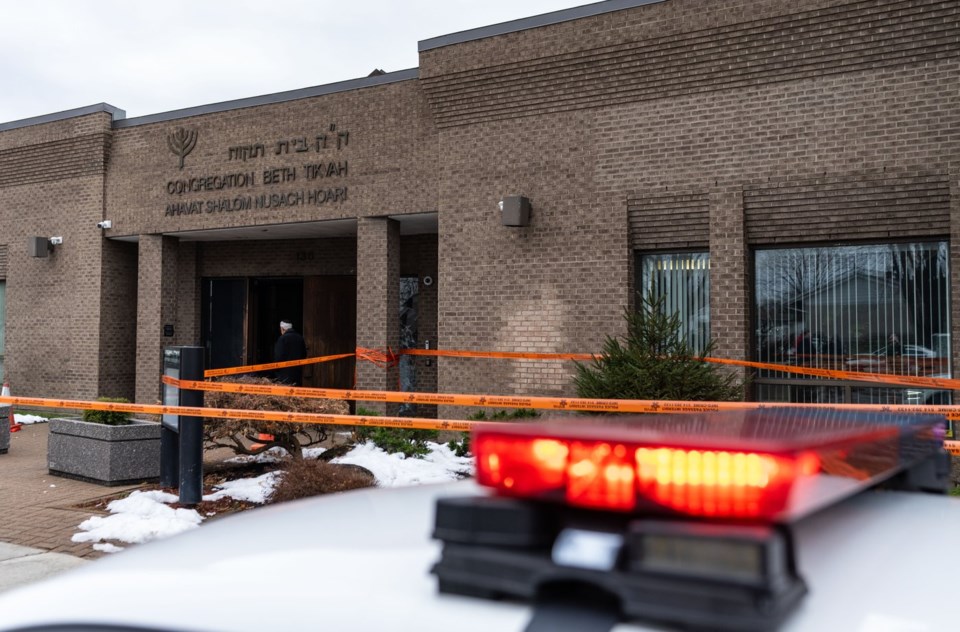OTTAWA — As conflicts continue to erupt around the globe, a new survey suggests that Canadians are anxious about relationships between groups here at home — particularly between Muslim and Jewish Canadians.
The survey of 1,578 Canadians, conducted by Leger Marketing for the Association for Canadian Studies between Jan. 17 and 19, 2025, asked respondents for their perceptions of relations between Muslim, Jewish, Indigenous, white and other Canadians.
Across Canada, 43 per cent of respondents said the relationship between Muslim and Jewish Canadians was "bad."
The poll says 38 per cent of those surveyed said relations between Muslim and non-Muslim Canadians were bad, 35 per cent said relations between Indigenous and non-Indigenous Canadians were bad, 19 per cent said relations between white and non-white Canadians were bad and 18 per cent said relations between Jewish and non-Jewish Canadians were bad.
The polling industry's professional body, the Canadian Research Insights Council, says online surveys cannot be assigned a margin of error because they do not randomly sample the population.
When asked how they view relations between Muslim and Jewish Canadians, people aged 18-34 expressed the least concern — only 34 per cent said they thought they were bad — while 49 per cent of those 55 and older gave the same answer.
Respondents in Quebec had the worst impression of Muslim-Jewish Canadian relations — 48 per cent of them said they were bad — while Albertans had the most optimistic perception, with just 38 per cent saying they were bad.
Overall, 25 per cent of respondents said they thought the relationship between the two groups was good, while 32 per cent said they didn't know or preferred not to answer.
Jack Jedwab is president and CEO of the Metropolis Institute and the Association for Canadian Studies, which commissioned the study. He said the way Canadians perceive relations between communities can be very event-driven.
Looking back at past surveys which asked similar questions, Jedwab said it's clear that Canadians' views of the relationship between Muslims and Jews have been consistently grim since the Hamas attack on Israel of Oct. 7, 2023 touched off the war in Gaza.
"I think it's largely driven by events post-October 7," Jedwab said. "It doesn't surprise me that this is the one that they see as particularly difficult. The issue arising from that is, you know, is there something that needs to be done to try to improve that relationship?"
Amira Elghawaby, Canada’s special representative on combating Islamophobia, said in a media statement that "at a time of growing polarization, including a rise in hate crimes, disinformation and misinformation, the need for Canadians to come together to combat harmful narratives and better get to know one another remains urgent."
She said Canadians have seen the deadly consequences of hatred.
"It’s notable that the poll shows that people under the age of 35 are less inclined to feel that relations between Canadian Muslims and Canadian Jews are 'bad.' This is a hopeful sign for the future," she said.
Michael Bueckert, interim president of Canadians for Justice and Peace in the Middle East, said that while there are significant tensions in Canada over Israel's actions in Gaza, they can't be interpreted as part of a "Jewish-vs-Muslim issue."
"This may indeed be what Canadians think, but it reflects a false and widespread misconception that Israel-Palestine is fundamentally a religious conflict between Jews and Muslims, rather than a political issue about human rights and international law," Bueckert said.
Richard Robertson, director of research and advocacy at B'nai Brith Canada, said that the poll's results are "concerning" and should encourage leaders to take a stronger stand against the "protests, the rhetoric and events that have been fomenting hate and division."
"We believe that the strongest Canada is a Canada where all like-minded individuals from all faiths and cultural backgrounds are united in the betterment of our country," Robertson said.
Deborah Lyons, Canada’s special envoy on combating antisemitism, said in a media statement that public perceptions of the relationship between Canadian Muslims and Jews don't always reflect real life.
"In truth, these communities share far more in common than many assume, including resilience and perseverance in combating hate and discrimination," Lyons said.
This report by The Canadian Press was first published Feb. 9, 2025.
Catherine Morrison, The Canadian Press
